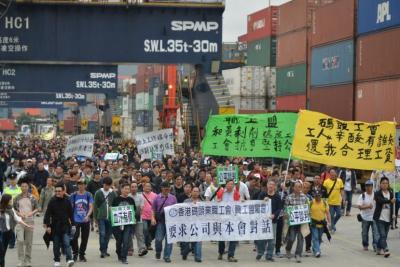Solidarity protest in Sydney, April 19, 2013, organised by the Australia-Venezuela Solidarity Network. Photos by Peter Boyle.
By Ewan Robertson, Mérida, Venezuela
April 19 2013 -- Venezuelanalysis.com –- Nicolas Maduro was sworn in as Venezuela's president for the constitutional period 2013–2019 today, promising to continue Hugo Chavez’s legacy and spearhead “a revolution of the revolution”.
In the National Assembly in Caracas, Maduro took his presidential oath before assembly president Diosdado Cabello.
“I swear by the whole people of Venezuela, by the supreme commander [Hugo Chavez], that I will abide by and make respected the constitution of the laws of the republic ... to construct an independent, free and socialist nation for all”, Maduro declared.
"Speech by Lenin at a Rally of Workers", by Isaak Israelovitch Brodsky (1929).
By Phil Gasper
Bolivarian Revolution inspires Philippines revolutionaries

PLM members.
By Sonny Melencio

PSUV election rally. Photo by Tamara Pearson/Venezuelanalysis.
The Venezuelan people have spoken: Nicolas Maduro is president
End the opposition violence! Respect the democratic process!
No US-backed intervention in Venezuela!
The Venezuelan people have spoken: Nicolas Maduro is president
End the opposition violence! Respect the democratic process!
No US-backed intervention in Venezuela!
April 17, 2013 -- The Australia-Venezuela Solidarity Network joins with all those voices for democracy and peace to call for an immediate end to the opposition-initiated violence now occurring in Venezuela.
On April 14, a majority of Venezuelans voted for the United Socialist Party of Venezuela’s (PSUV) presidential candidate Nicolas Maduro. In doing so, they voted to continue the Bolivarian revolution previously led by Hugo Chávez.
Venezuela has one of the most transparent and secure voting systems in the world and the presidential elections were, according to all independent observers, free, fair and constitutional. The election result must be respected.
Understanding Venezuela's election result: 'This time it was up to us to do it alone, and we won'

Election day, April 14, 2013.
By Tamara Pearson, Merida
Eyewitness Venezuela: Maduro wins close victory; Right wing reacts violently

By Ryan Mallett-Outtrim, Merida
April 16, 2013 -- Green Left Weekly -- The room erupted into cheers when the election result was announced. For hours, the city of Merida's most ardent supporters of socialist presidential candidate Nicolas Maduro had gathered in the local offices of the United Socialist Party of Venezuela (PSUV). However, after a few moments, the closeness of the numbers sank in.
At the time of writing, the National Electoral Council (CNE) had announced that with 99% of votes counted, the PSUV's Maduro won with 50.6%. His closest rival, Henrique Capriles, received 49.1%; giving Maduro a slim 1.5% victory.
In the last presidential elections, Maduro's predecessor Hugo Chavez defeated Capriles – the candidate of the US-backed right wing hostile to the Chavez-led Boliviaran revolution -- by just over 10%,. Many supporters of the revolution were expecting a similar result.
Last month, a joint Barclays/Datanalisis report gave Maduro a 14.4% lead, while pollster Hinterlaces predicted his victory would be 18%.
France: Parti de Gauche vows to build ‘citizens’ revolution’ for ecosocialism

Down with austerity!
By Dick Nichols
April 12, 2013 – Links International Journal of Socialist Renewal -- At the third national congress of the Left Party (Parti de Gauche) held in Bordeaux from March 22 to 24, France’s newest and fastest-growing socialist group seemed to come of age.
Only four years old, the Left Party was born after its leading figure, Jean-Luc Melenchon, a long-time leader of left currents in the Socialist Party (PS), abandoned it after the tendencies in the PS opposing neoliberal austerity mustered only 19% support at its 2008 congress.
Mauritius: Flash flood hits Lalit de Klas’s offices and archives

By Lindsay Collen
Dock workers defy Hong Kong's richest person, seek solidarity, attract huge support

Striking Hong Kong dockworkers and supporters march at the world's third-busiest port. The two-week-old strike has bottlenecked cargo and gained enormous public sympathy. Photo: Left 21.
By the Union of Hong Kong Dockers
April 9, 2013 -- Text via ESSF -- Hundred members of the Union of Hong Kong Dockers (UHKD) are striking to demand pay rise while their wages have not risen in the past 15 years. Moreover they are also fighting for the collective bargaining right to negotiate with the management.
We ask you to send protest letters to the Hong Kong International Terminals (HIT) as well as its parent companies Hutchison Port Holdings Trust (HPHT), Hutchison Whampoa Ltd (HWL) and the Hong Kong SAR government to support the dockers.
For this purpose we attach a template which you can adapt and send, with a copy to the Hong Kong Confederation of Trade Unions (hkctu@hkctu.org.hk).
